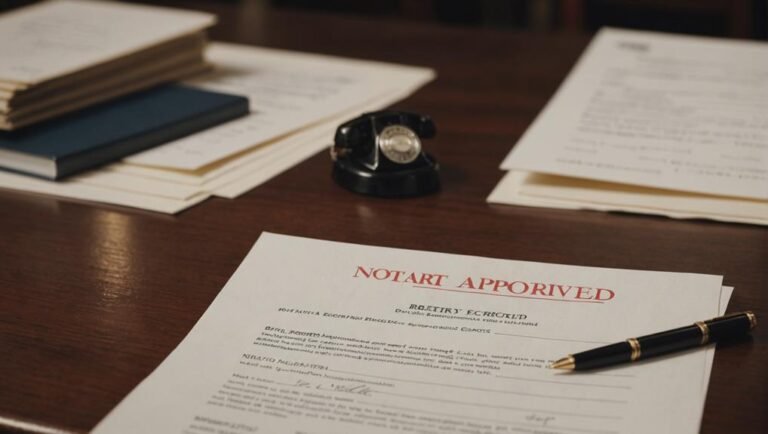To determine the maximum fees for your notary services in Texas, follow the state's regulations. You can charge up to $6 for the first signature and $1 for each additional one. Administering oaths can be up to $6 per act. Display your fees prominently to ensure clarity. Employers can help regulate fees within legal limits. Be detailed in discussing fees before service. Keep records for tax purposes. Varying states have differing fee structures. Consider document complexity, travel, urgency, services, and expertise. Research standard fees, factor in expenses, and clarity. Discuss extra arrangements and fees upfront to avoid surprises.
Key Takeaways
- Texas notaries can charge up to $6 for the first signature and $1 for each additional signature.
- Administering an oath with a certificate can be charged at a maximum of $6 per act.
- Notaries can charge 50 cents per page for providing copies of records.
- Taking a deposition allows for charging $6 for the oath and 50 cents per 100 words.
- Employers can influence fees but must ensure they don't exceed legal limits.
Texas Notary Fee Regulations
When operating as a notary in Texas, it's important to adhere to the state regulations regarding fee charges for various notarial acts.
In Texas, notaries are permitted to charge up to $6 for the first signature and $1 for each additional signature when taking an acknowledgment or proof.
Administering an oath or affirmation with a certificate and seal can be charged at a maximum of $6 per act.
If you're providing copies of records or papers kept in your notary office, the fee is set at 50 cents per page.
When taking a deposition in Texas, you can charge $6 for the oath, certificate, and seal, along with an additional 50 cents per 100 words.
Maximum Allowable Notary Fees
The Maximum Allowable Notary Fees in Texas are subject to specific legal constraints to guarantee fair and regulated pricing for notarial services. Texas law outlines the maximum fees that can be charged for various notarial acts. For instance, acknowledgments and jurats have set maximum fees, as do other notarial services.
Online notaries in Texas may charge an additional fee for online notarizations, within the legal limits. While employers can influence the fees charged by their notaries, they must make sure that these charges don't exceed the maximum allowable limits set by law.
As a Texas notary, it's essential to provide a detailed bill for all services rendered and discuss the fees with signers before notarization to prevent any misunderstandings or conflicts. By following these regulations, notaries in Texas can maintain transparency and fairness in their fee structures.
Posting Notary Fees in Texas
Notaries in Texas must prominently display their fees as mandated by state law to ensure transparency and adherence. Here are some key points to keep in mind regarding posting notary fees in Texas:
- Visibility: It's important to make sure that your fee schedule is easily visible to clients visiting your office or establishment.
- Compliance: Texas law requires that notaries keep their fees posted at all times in a prominent location to meet legal requirements.
- Ordering Fee Schedule: Notaries can obtain a fee schedule to meet the posting requirements, making it convenient for clients to access this information.
- Written Invoice: In addition to posting fees, notaries in Texas are also obligated to provide clients with a written itemized invoice, improving transparency in the fee structure.
Employer's Role in Fee Determination
To determine the fees that notaries can charge customers for notarial services, employers hold the authority to set and regulate these rates within legal boundaries. Employers play a crucial role in fee determination by establishing transparent fee structures and guaranteeing compliance with legal limits.
They've the responsibility to collaborate with notaries in outlining clear agreements that specify how fees will be collected and managed. By working closely with notaries, employers can help create a fair and transparent fee system that benefits both the service providers and the customers.
It's essential for employers to oversee the setting of notary fees to maintain consistency and professionalism in the industry. This collaboration between notaries and employers guarantees that customers receive reliable notarial services at reasonable rates while upholding legal requirements.
Charging for Additional Notary Expenses
When itemizing fees for your notarial services in Texas, make sure to provide a detailed breakdown that includes all additional expenses incurred during the notarization process. Here are some key points to take into account:
- Discuss Fees Upfront: Before conducting the notarization, have a transparent conversation with the signers about the fees involved, including any additional expenses that may arise.
- Detailed Billing: Guarantee that your bill clearly distinguishes between notary fees and any extra costs such as travel expenses. This helps in maintaining transparency and avoiding misunderstandings.
- Receipt for Clarity: Provide a written receipt to the signers that clearly separates the notary fees from any other related expenses incurred during the notarization process.
- Accurate Record-Keeping: Keep meticulous records of all fees charged, including any additional expenses, to maintain accurate financial records and ensure compliance with notarial regulations.
Taxation of Notary Fees
Keeping detailed records of your notary fees is vital for understanding the taxation implications related to your notarial services. When it comes to taxation, notary fees are considered taxable income if they aren't submitted to your employer. It's advisable to consult a tax advisor for specific details on how to handle the taxation of your notary fees properly.
To make sure accurate tax reporting, it's important to separate your notary fees from other expenses on written receipts. By maintaining clear and organized records of your notary fees, you can effectively track your income and expenses for tax purposes. This practice will help you comply with tax laws and avoid any potential issues related to the taxation of your notary services.
Understanding the tax implications of your notary fees is an important aspect of managing your notarial business responsibly. By keeping accurate records and seeking professional advice when needed, you can navigate the taxation of your notary fees confidently.
Notary Fees by Notarial Act
Notaries establish specific fees for different notarial acts, which vary according to state regulations and the type of service provided. When performing the notarial act, understanding the fee schedule in your state is crucial.
Here are some examples of notarial fees across different states:
- In Texas, notaries can charge $7.50 for certain notarial acts like an acknowledgment or jurat per signature, or an oath per act.
- New Hampshire has established fees of $10 for specific notarial acts.
- New Jersey has varying fees ranging from $2.50 to $25 for different notarial acts, including those related to real estate transactions.
- States such as Alaska, Arizona, and Kentucky require notaries to inform signers of any fees charged for notarial acts, while others like Michigan, North Carolina, and Pennsylvania mandate posting or advising on fees, and some like Georgia, Missouri, and Nevada require displaying a fee schedule prominently.
Notary Fee Disclosure Requirements
Effective disclosure of notary fees is a fundamental aspect of maintaining transparency and trust in notarial services. Notaries are required to adhere to fee disclosure requirements set by their state to guarantee clients are informed of charges associated with notarial acts.
In states like Michigan, North Carolina, and Pennsylvania, notaries are mandated to either post fee schedules or inform clients on fees before providing services. Similarly, Georgia, Missouri, and Nevada have regulations that compel notaries to display their fee structures prominently. These fee disclosure requirements vary across states but share the common goal of promoting transparency in notarial transactions.
Notary Travel Fees Considerations
Considering travel fees as a notary in Texas involves determining rates for mileage, time, and any additional arrangements required for mobile services.
When setting travel fees as a notary public, keep these guidelines in mind:
- Mileage Charges: Calculate the distance traveled from your location to the client's site and establish a reasonable rate per mile to cover gas and wear and tear on your vehicle.
- Time-Based Fees: Factor in the time spent traveling to and from the appointment, as well as the duration of the notarization process itself. Determine a fair hourly rate that reflects your time and expertise.
- Additional Arrangements: Consider any special accommodations or extra services requested by the client, such as after-hours appointments or weekend availability. Decide on fees for these additional arrangements upfront.
- Discuss and Agree: It's crucial to openly communicate with clients about travel fees before providing mobile notary services to guarantee transparency and avoid misunderstandings.
Frequently Asked Questions
What Is the Maximum You Can Charge for a Notary?
When setting your fees as a notary, always adhere to pricing regulations. Consider customer expectations while staying competitive in the market. Remember the maximum charges allowed: $6 for acknowledgment, oath, or seal, plus additional fees as specified.
What Can a Notary Charge in Texas?
In Texas, as per Notary fees and Texas regulations, pricing strategies vary. Notaries can charge $6 for first signature, $1 for each additional. Administering an oath costs $6. Copying papers is 50 cents/page. Providing a sealed certificate is $6.
What Is the New Texas Notary Law?
In Texas, the new Notary Law outlines notary responsibilities, qualifications, and fees. Notaries can charge set amounts for various services like acknowledgments, oaths, depositions, and online notarizations. Travel fees are also permitted.
What Can a Notary Charge in California?
When notarizing in California, you can charge up to $15 per signature. Additional fees for oaths, copies, and travel are allowed. Make sure to provide a written fee schedule upon request as per California regulations.
Conclusion
You've reached the peak of your notary fee potential. Now, let your fees soar to new heights, as you delicately navigate the domain of acceptable charges.
Embrace the art of pricing with finesse, maximizing your earning potential while maintaining professionalism and integrity.
Let your fees bloom like a well-tended garden, attracting clients with their beauty and value.
You're now the master of your notarial fees, ready to conquer the world of notarization with grace and precision.






